新概念英语第二册Lesson 4 An exciting trip课件 (共42张PPT)
文档属性
| 名称 | 新概念英语第二册Lesson 4 An exciting trip课件 (共42张PPT) |  | |
| 格式 | ppt | ||
| 文件大小 | 1.7MB | ||
| 资源类型 | 教案 | ||
| 版本资源 | 新概念英语 | ||
| 科目 | 英语 | ||
| 更新时间 | 2023-10-06 07:35:28 | ||
图片预览

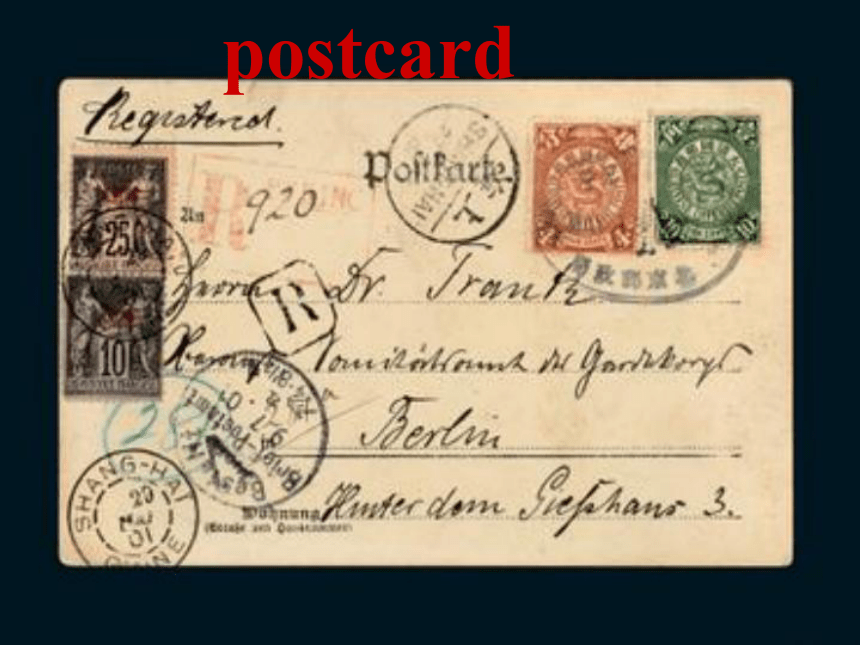
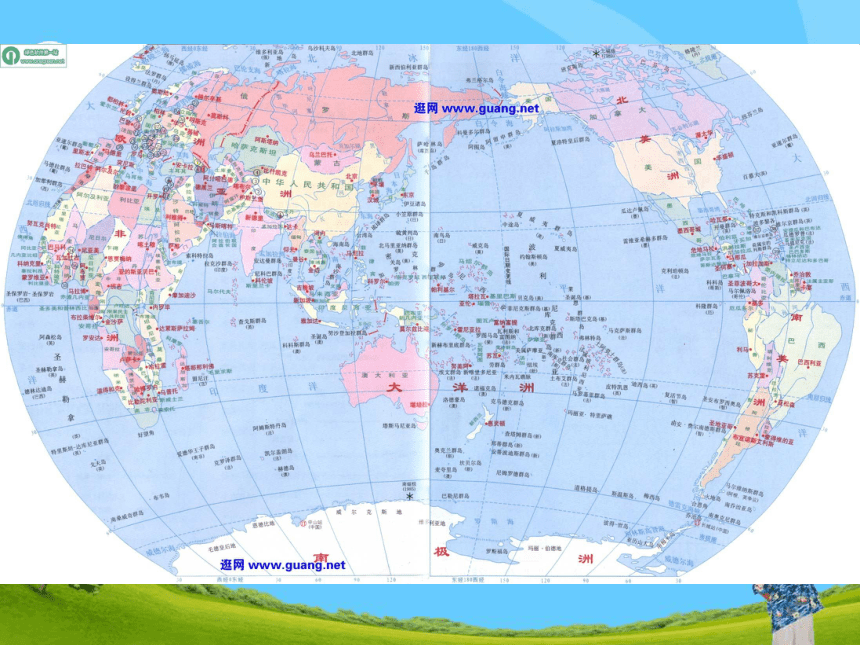

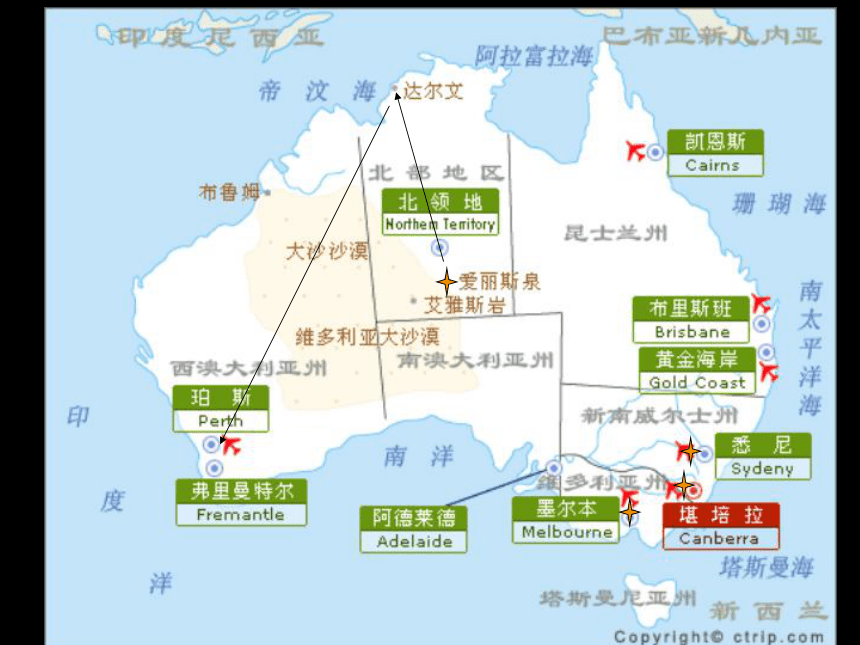
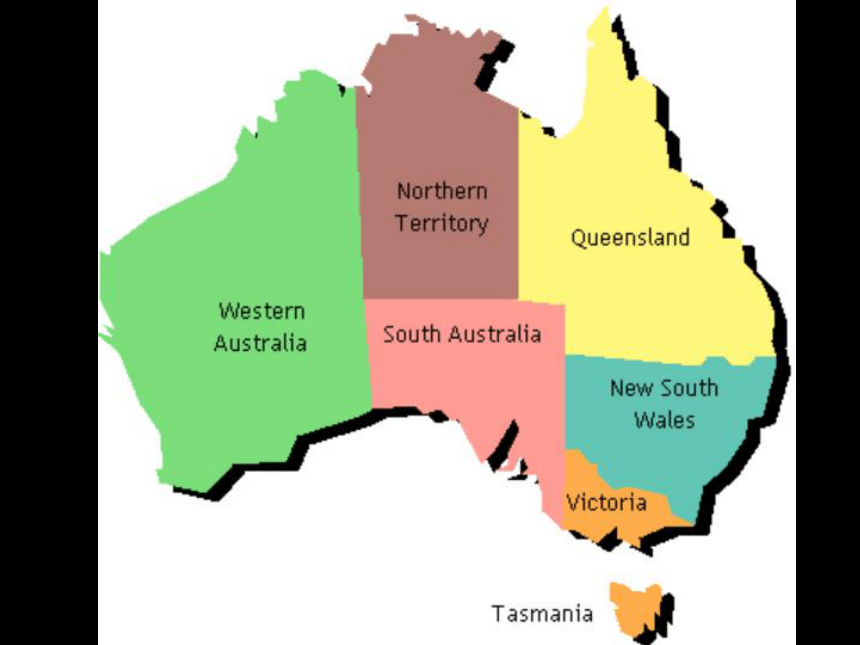
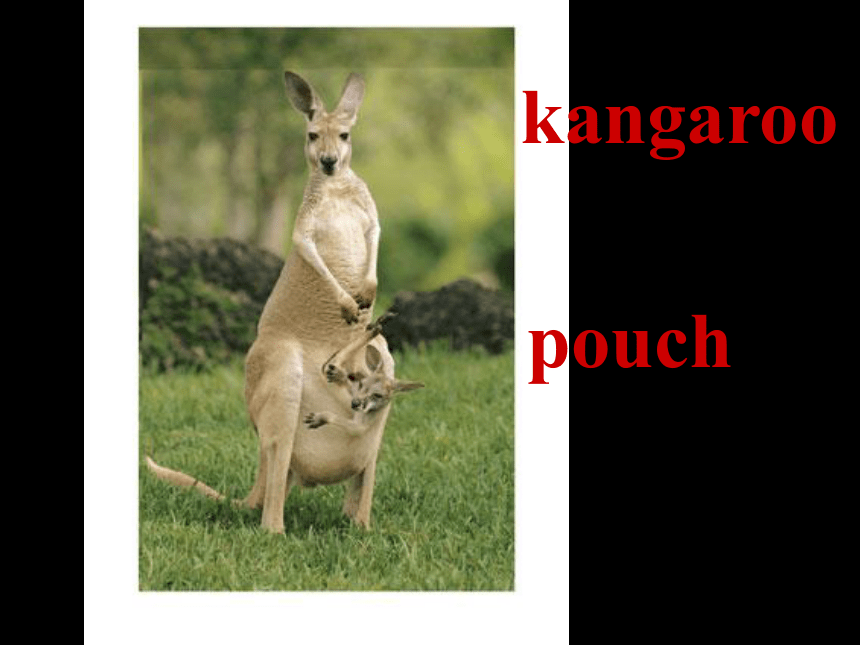
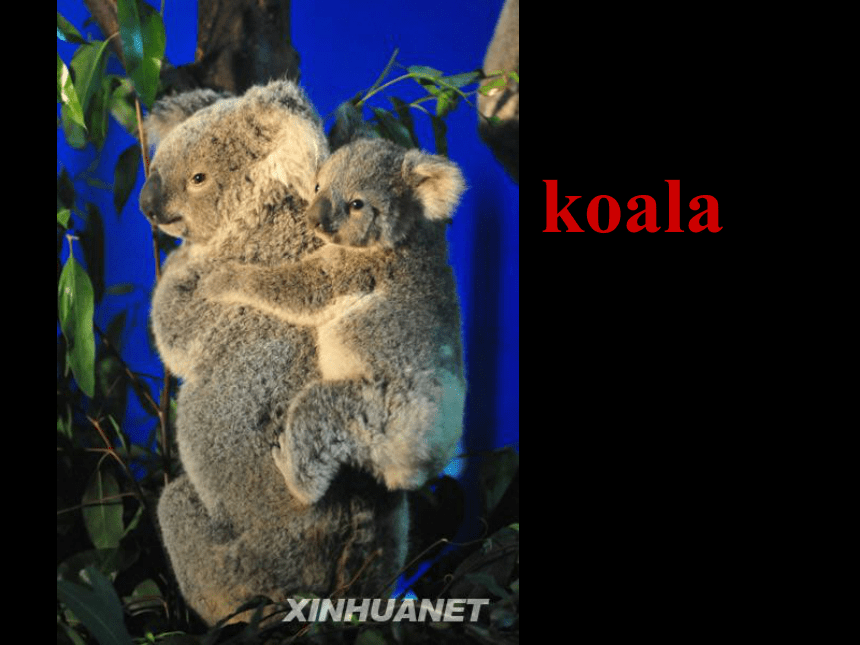

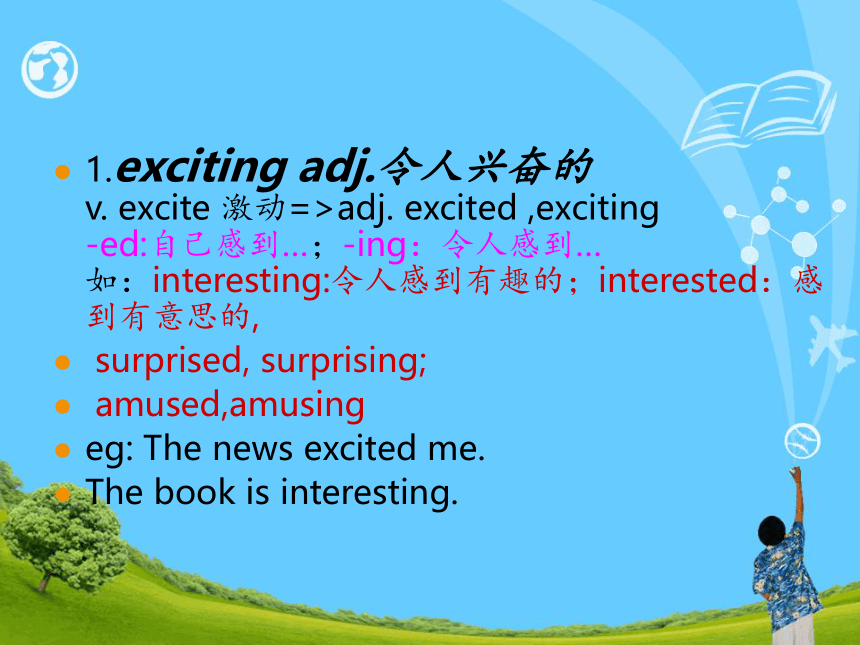
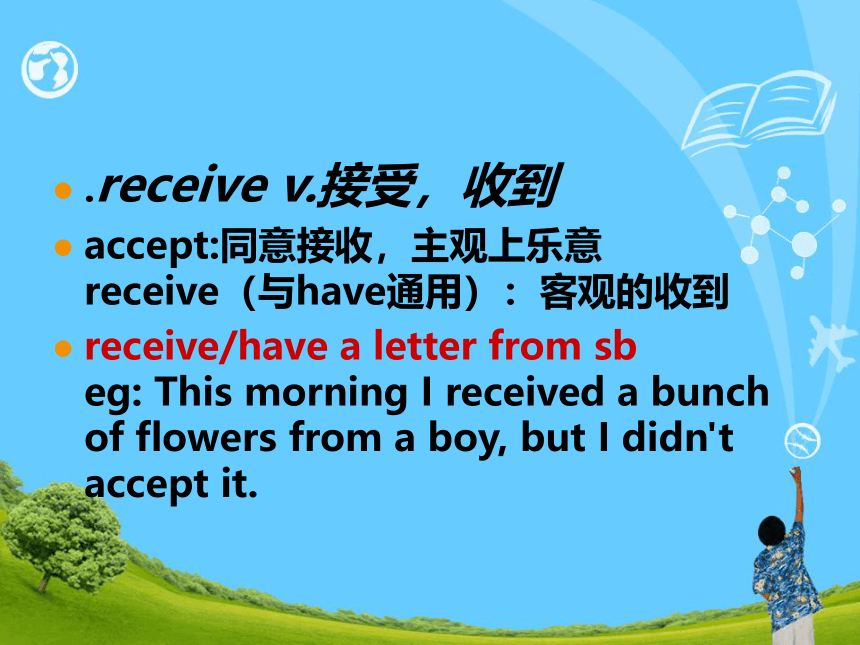
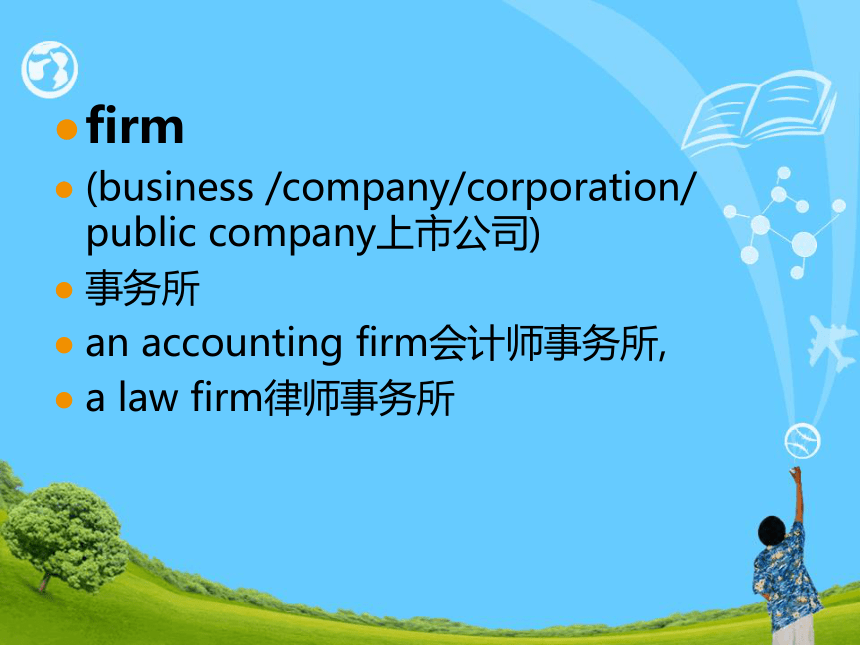
文档简介
(共42张PPT)
Lesson 4
An exciting trip
postcard
kangaroo
pouch
koala
1.exciting adj.令人兴奋的 v. excite 激动=>adj. excited ,exciting -ed:自己感到…;-ing:令人感到… 如:interesting:令人感到有趣的;interested:感到有意思的,
surprised, surprising;
amused,amusing
eg: The news excited me.
The book is interesting.
.receive v.接受,收到
accept:同意接收,主观上乐意 receive(与have通用):客观的收到
receive/have a letter from sb eg: This morning I received a bunch of flowers from a boy, but I didn't accept it.
firm
(business /company/corporation/ public company上市公司)
事务所
an accounting firm会计师事务所,
a law firm律师事务所
different be different from
讲座主题: love is quite different from marriage.
As long as you stand, the sky is not going to fall down
只要你站着,天就不会塌下来
As long as I am alive, I will take care of you.
只要我活着,我就会照顾你
poison 毒药
One’s meat is another’s poison一个人喜欢的东西未必是另外一个人喜欢的
Women have different tastes for men 女人看男人的眼光不一样
poison 在道德上败坏,毒害
poison our image /reputation毒害形象/名声
ruin one’s image and reputation 毁坏了形象和名声
Many Japanese cartoons have poisoned the minds of the young people.
很多日本卡通毒害了年轻人的大脑
Some bad guys have poisoned/ruined the image of the whole nation.
一些在海外中国人的表现败坏了整体的名族形象
difference the difference between A and B
tell the difference between right and wrong = tell right from wrong = distinguish between right and wrong=distinguish right from wrong分清是非
distinguished 杰出的,尊敬的,
distinguished ladies and gentlemen
a distinguished professor 有名望的教授
Our voices are very much alike and even our close friends can’t tell the difference.
我们声音类似,无人能够辨明差异
The fake LV bag and the real one are very much alike, no one can tell the difference.
正品和冒牌品如此之相似,以至于人们都看不出来有什么不同
make a difference 有影响 起重要作用
Give me a chance, I will make a difference
请给我一次机会,我会做得很好
Thank you very much; your help really made a difference.
谢谢你,真是帮了大忙
make no difference 无关紧要。
center
at the city center/ in the downtown area 市区
shopping center/mall 购物中心
recreation center 娱乐中心 leisure center 休闲中心
we have a lot of recreation and leisure centers in HangZhou. I am going to take you to one of them today. It is famous for its foot massage.
abroad
go/study/do business abroad去国外,在国外读书,在国外做生意
abroad VS overseas
overseas companies/ Chinese/ fast-food restaurant, overseas experts国外专家
international companies 跨国企业
Lesson 4 An exciting trip
I have just received a letter from my brother, Tim. He is in Australia. He has been there for six months. Tim is an engineer. He is working for a big firm and he has already visited a great number of different places in Australia. He has just bought an Australian car and has gone to Alice Springs, a small town in the centre of Australia. He will soon visit Darwin. From there, he will fly to Perth. My brother has never been abroad before, so he is finding this trip very exciting.
Language points
1. I have just received a letter from my brother.
收到某人来信
2.He is working for a big firm.
get a letter from sb.
have a letter from sb.
hear from sb.
在…上班、任职,还可以用work at/in
e.g.My father works for a business company.
3. he has already visited a great number of
different places in Australia.
a number of+可数名词的复数,number前一般
可用large, great, small等形容词强调数量大小。
Language points
4. He has just bought an Australian car and has
gone to Alice springs.
He has gone to the south.(还在)
He has been to the south.(去过)
5. He is finding this trip very exciting.
find+n+adj.觉得…怎么样
e.g.I find the film boring.
Do you find the book very interesting
现在完成时态
Winter
has already come.
Grammar
现在完成时的构成形式
have
done
has
助动词
过去分词
Grammar
用来表示动作或状态发生在过去,但它的影响现在还存在。
They have left.
--他们已经离开了,也就是说现在他们人不在这里
I have had my lunch.
--我已经吃过午饭了,也就是说我现在不饿
现在完成时的含义
也可表示持续到现在的动作或状态。
He has learned English since 2001.
--从2001年开始学的,现在还在继续学着呢
sum up
一、现在完成时
1)构成
肯定句:主语+have/has+过去分词+其它
否定句:主语+have/has not+过去分词+其它
疑问句:Have/Has+主语+过去分词+其它
He has been to Australia.
He has not been to Australia.
Has he been to Australia
now
past
future
一般过去时
一般过去时表示的是纯粹在过去发生的事情
现在完成时表示的是在过去某个时间开始并持续到现在的动作/状态,或者发生在过去却对现在造成的影响
Grammar
现在完成时与一般过去时的比较
1)一般过去时表示过去某时发生的动作或单纯叙述过去的事情,强调动作;
现在完成时为过去发生的,强调过去的事情对现在的影响,强调的是影响。
I saw this film yesterday.
(强调看的动作发生过了。)
I have seen this film. (强调对现在的影响,电影的内容已经知道了。)
2一般过去时常与具体的表示过去的时间状语连用;
现在完成时通常与模糊时间状语连用或无时间状语。
一般过去时的时间状语: yesterday, last week,…ago, in1990, in October, just now, …-- 具体的时间状语 现在完成时的时间状语: for, since, so far, ever, never, just, yet, till/until, up to now, in the past few years, recently, … --模糊的时间状语
句子中如有过去时的时间副词(如 yesterday, last, week, in 1960)时,不能使用现在完成时,要用过去时
错Tom has written a letter to his parents last night.
对Tom wrote a letter to his parents last night.
Grammar
3现在完成时可表示持续到现在的动作或状态,动词一般是延续性的,如live,teach,learn,work,study, know. 一般过去时常用的非持续性动词有come, go, leave, start, die, finish, become, get married等。
She joined the League three years ago.
(加入的动作不是延续的)
She has been in the League for three years (since three years ago).(在团内的状态可延续)
She has been a League member for three years (since three years ago).(是团员的状态可持续)
Grammar
延续动词表示经验、经历;
瞬间动词表示行为的结果,不能与表示一段
时间的状语连用。
比较延续动词与瞬间动词
He has finished the work.他已完成了那项工作。 (表结果) I’ve known him since then.我从那时起就认识他了。(表经历)
Grammar
since 用来说明动作起始时间— “自从……”
for用来说明动作延续时间长度— “长达……”
I have lived here for more than twenty years. I have lived here since I was born. My aunt has worked in a company since 1949. I have not heard from my uncle for a long time.
比较since和for
并非有for 作为时间状语的句子都用现在完成时
I worked here for more than twenty years. (我现在已不在这里工作。)
I have worked here for many years. (现在我仍在这里工作。)
Grammar
He has gone to Shanghai.
他(已经)去上海了。
He has been to Shanghai.
他(曾经) 去过上海。
比较 have/has been to , have/has gone to
Grammar
He died 10 years ago.
--- He ____ ____ ____ for 10 years / since 10 years ago.
2. He borrowed the book 2 weeks ago.
--- He ____ ____ the book for 2 weeks.
3. He bought the motorbike a month ago.
---He ____ ____ the motorbike for a month.
4. He arrived here three days ago.
--- He ____ ____ here since three days ago.
5. They turned off the light 2 hours ago.
--- The light ____ ____ ____ for 2 hours.
6. He left here 2 years ago.
--- He ____ ____ ____ from here for 2 years.
7. The film began 30 minutes ago.
--- The film ____ ____ ____ for 30 minutes.
8. They opened the door an hour ago.
--- The door ____ ____ ____ for an hour.
9. They closed the door an hour ago.
--- The door ____ ____ ____ for an hour.
10. He joined the army last year.
--- He ____ ____ a ____ for a year.
--- He ____ ____ ____ the army for a year.
--- It ____ a year ____ he joined the army.
延续性动词和瞬间性动词之间的转化
Exercise
sum up
2)用法
1.过去发生的动作对现在的影响或产生的结果。常与表示时间的副词连用,如yet, just, before, recently, ever, never等。
e.g. We have just won the match.
I have never been to Australia before.
一、现在完成时
sum up
2)用法
1.表示从过去开始延续到现在的动作或状态,常与表示一段时间的时间状态连用,如so far, up till now, since, for a long time, in the past few years, those days等。
e.g. So far, he has broken two world records.
I have worked here for four years.
一、现在完成时
sum up
2)用法
3.短暂性动词在现在完成时中不能与表示一段时间的状语连用,常见的动词有die, arrive, leave, go, refuse, finish, marry, buy等。
e.g. His grandfather has died for three years.
His grandfather has been dead for three years.
I have bought the car for half a year.
I have got the car for half a year.
一、现在完成时
I have just _________ a letter_____my brother, Tim. He is in Australia. He has _____ there for six months. Tim is an engineer. He is working ____a big firm and he has already ______a great number of different places in Australia. He has just ______an Australian car and has _____to Alice Springs, a small town in the centre of Australia. He will soon visit Darwin. From there, he will fly to Perth. My brother has never _____ abroad before, so he is finding this trip very exciting.
received
from
been
for
visited
bought
gone
been
Interrupt
打断
在我们的日常生活和商务谈判中,有时会对别人的看法有不同意见,但是贸然打断别人的话是很不礼貌的……
试问,怎样才能打断别人的话而又不显唐突?
New Words
interrupt 中断 打断
moment 片刻 瞬间
second 秒 第二
mind 介意 心意
cut …off 打断
issue 话题
interject 中断
urgent 急迫的, 紧要的
For example
1. May I interrupt you a moment
打断您一会儿,可以吗?
2. Excuse me for interrupting you. I hope you will explain yourself in more details.
对不起打断您的话,希望你能解释更详细点。
3. If you don't mind, may I say one word here
请别介意,我可以插一句话吗?
4. Just a moment, please. Allow me to say something here.
请稍停一下,允许我插几句话。
5.I’m sorry, but may I interrupt you a few seconds
(很抱歉,我能打断您一下么?)
6.Excuse me for interrupting you.
(对不起打断您说话了。)
7.Just a moment please, I want to say something about the issue.
(稍等下好吗?我想就这个问题说明一下。)
8.May I please interject
(我能插一句吗 )
Let me interrupt for a minute, please.
请让我打断一下。
Can I say something
我可以说句话吗
I’m sorry to cut you off, but I've got something urgent to tell you.
很抱歉打断你们,但是我有个急事要告诉你们。
I'm sorry to interrupt you, but may I ask you something quickly
很抱歉打断你们,我能很快问个问题吗
Lesson 4
An exciting trip
postcard
kangaroo
pouch
koala
1.exciting adj.令人兴奋的 v. excite 激动=>adj. excited ,exciting -ed:自己感到…;-ing:令人感到… 如:interesting:令人感到有趣的;interested:感到有意思的,
surprised, surprising;
amused,amusing
eg: The news excited me.
The book is interesting.
.receive v.接受,收到
accept:同意接收,主观上乐意 receive(与have通用):客观的收到
receive/have a letter from sb eg: This morning I received a bunch of flowers from a boy, but I didn't accept it.
firm
(business /company/corporation/ public company上市公司)
事务所
an accounting firm会计师事务所,
a law firm律师事务所
different be different from
讲座主题: love is quite different from marriage.
As long as you stand, the sky is not going to fall down
只要你站着,天就不会塌下来
As long as I am alive, I will take care of you.
只要我活着,我就会照顾你
poison 毒药
One’s meat is another’s poison一个人喜欢的东西未必是另外一个人喜欢的
Women have different tastes for men 女人看男人的眼光不一样
poison 在道德上败坏,毒害
poison our image /reputation毒害形象/名声
ruin one’s image and reputation 毁坏了形象和名声
Many Japanese cartoons have poisoned the minds of the young people.
很多日本卡通毒害了年轻人的大脑
Some bad guys have poisoned/ruined the image of the whole nation.
一些在海外中国人的表现败坏了整体的名族形象
difference the difference between A and B
tell the difference between right and wrong = tell right from wrong = distinguish between right and wrong=distinguish right from wrong分清是非
distinguished 杰出的,尊敬的,
distinguished ladies and gentlemen
a distinguished professor 有名望的教授
Our voices are very much alike and even our close friends can’t tell the difference.
我们声音类似,无人能够辨明差异
The fake LV bag and the real one are very much alike, no one can tell the difference.
正品和冒牌品如此之相似,以至于人们都看不出来有什么不同
make a difference 有影响 起重要作用
Give me a chance, I will make a difference
请给我一次机会,我会做得很好
Thank you very much; your help really made a difference.
谢谢你,真是帮了大忙
make no difference 无关紧要。
center
at the city center/ in the downtown area 市区
shopping center/mall 购物中心
recreation center 娱乐中心 leisure center 休闲中心
we have a lot of recreation and leisure centers in HangZhou. I am going to take you to one of them today. It is famous for its foot massage.
abroad
go/study/do business abroad去国外,在国外读书,在国外做生意
abroad VS overseas
overseas companies/ Chinese/ fast-food restaurant, overseas experts国外专家
international companies 跨国企业
Lesson 4 An exciting trip
I have just received a letter from my brother, Tim. He is in Australia. He has been there for six months. Tim is an engineer. He is working for a big firm and he has already visited a great number of different places in Australia. He has just bought an Australian car and has gone to Alice Springs, a small town in the centre of Australia. He will soon visit Darwin. From there, he will fly to Perth. My brother has never been abroad before, so he is finding this trip very exciting.
Language points
1. I have just received a letter from my brother.
收到某人来信
2.He is working for a big firm.
get a letter from sb.
have a letter from sb.
hear from sb.
在…上班、任职,还可以用work at/in
e.g.My father works for a business company.
3. he has already visited a great number of
different places in Australia.
a number of+可数名词的复数,number前一般
可用large, great, small等形容词强调数量大小。
Language points
4. He has just bought an Australian car and has
gone to Alice springs.
He has gone to the south.(还在)
He has been to the south.(去过)
5. He is finding this trip very exciting.
find+n+adj.觉得…怎么样
e.g.I find the film boring.
Do you find the book very interesting
现在完成时态
Winter
has already come.
Grammar
现在完成时的构成形式
have
done
has
助动词
过去分词
Grammar
用来表示动作或状态发生在过去,但它的影响现在还存在。
They have left.
--他们已经离开了,也就是说现在他们人不在这里
I have had my lunch.
--我已经吃过午饭了,也就是说我现在不饿
现在完成时的含义
也可表示持续到现在的动作或状态。
He has learned English since 2001.
--从2001年开始学的,现在还在继续学着呢
sum up
一、现在完成时
1)构成
肯定句:主语+have/has+过去分词+其它
否定句:主语+have/has not+过去分词+其它
疑问句:Have/Has+主语+过去分词+其它
He has been to Australia.
He has not been to Australia.
Has he been to Australia
now
past
future
一般过去时
一般过去时表示的是纯粹在过去发生的事情
现在完成时表示的是在过去某个时间开始并持续到现在的动作/状态,或者发生在过去却对现在造成的影响
Grammar
现在完成时与一般过去时的比较
1)一般过去时表示过去某时发生的动作或单纯叙述过去的事情,强调动作;
现在完成时为过去发生的,强调过去的事情对现在的影响,强调的是影响。
I saw this film yesterday.
(强调看的动作发生过了。)
I have seen this film. (强调对现在的影响,电影的内容已经知道了。)
2一般过去时常与具体的表示过去的时间状语连用;
现在完成时通常与模糊时间状语连用或无时间状语。
一般过去时的时间状语: yesterday, last week,…ago, in1990, in October, just now, …-- 具体的时间状语 现在完成时的时间状语: for, since, so far, ever, never, just, yet, till/until, up to now, in the past few years, recently, … --模糊的时间状语
句子中如有过去时的时间副词(如 yesterday, last, week, in 1960)时,不能使用现在完成时,要用过去时
错Tom has written a letter to his parents last night.
对Tom wrote a letter to his parents last night.
Grammar
3现在完成时可表示持续到现在的动作或状态,动词一般是延续性的,如live,teach,learn,work,study, know. 一般过去时常用的非持续性动词有come, go, leave, start, die, finish, become, get married等。
She joined the League three years ago.
(加入的动作不是延续的)
She has been in the League for three years (since three years ago).(在团内的状态可延续)
She has been a League member for three years (since three years ago).(是团员的状态可持续)
Grammar
延续动词表示经验、经历;
瞬间动词表示行为的结果,不能与表示一段
时间的状语连用。
比较延续动词与瞬间动词
He has finished the work.他已完成了那项工作。 (表结果) I’ve known him since then.我从那时起就认识他了。(表经历)
Grammar
since 用来说明动作起始时间— “自从……”
for用来说明动作延续时间长度— “长达……”
I have lived here for more than twenty years. I have lived here since I was born. My aunt has worked in a company since 1949. I have not heard from my uncle for a long time.
比较since和for
并非有for 作为时间状语的句子都用现在完成时
I worked here for more than twenty years. (我现在已不在这里工作。)
I have worked here for many years. (现在我仍在这里工作。)
Grammar
He has gone to Shanghai.
他(已经)去上海了。
He has been to Shanghai.
他(曾经) 去过上海。
比较 have/has been to , have/has gone to
Grammar
He died 10 years ago.
--- He ____ ____ ____ for 10 years / since 10 years ago.
2. He borrowed the book 2 weeks ago.
--- He ____ ____ the book for 2 weeks.
3. He bought the motorbike a month ago.
---He ____ ____ the motorbike for a month.
4. He arrived here three days ago.
--- He ____ ____ here since three days ago.
5. They turned off the light 2 hours ago.
--- The light ____ ____ ____ for 2 hours.
6. He left here 2 years ago.
--- He ____ ____ ____ from here for 2 years.
7. The film began 30 minutes ago.
--- The film ____ ____ ____ for 30 minutes.
8. They opened the door an hour ago.
--- The door ____ ____ ____ for an hour.
9. They closed the door an hour ago.
--- The door ____ ____ ____ for an hour.
10. He joined the army last year.
--- He ____ ____ a ____ for a year.
--- He ____ ____ ____ the army for a year.
--- It ____ a year ____ he joined the army.
延续性动词和瞬间性动词之间的转化
Exercise
sum up
2)用法
1.过去发生的动作对现在的影响或产生的结果。常与表示时间的副词连用,如yet, just, before, recently, ever, never等。
e.g. We have just won the match.
I have never been to Australia before.
一、现在完成时
sum up
2)用法
1.表示从过去开始延续到现在的动作或状态,常与表示一段时间的时间状态连用,如so far, up till now, since, for a long time, in the past few years, those days等。
e.g. So far, he has broken two world records.
I have worked here for four years.
一、现在完成时
sum up
2)用法
3.短暂性动词在现在完成时中不能与表示一段时间的状语连用,常见的动词有die, arrive, leave, go, refuse, finish, marry, buy等。
e.g. His grandfather has died for three years.
His grandfather has been dead for three years.
I have bought the car for half a year.
I have got the car for half a year.
一、现在完成时
I have just _________ a letter_____my brother, Tim. He is in Australia. He has _____ there for six months. Tim is an engineer. He is working ____a big firm and he has already ______a great number of different places in Australia. He has just ______an Australian car and has _____to Alice Springs, a small town in the centre of Australia. He will soon visit Darwin. From there, he will fly to Perth. My brother has never _____ abroad before, so he is finding this trip very exciting.
received
from
been
for
visited
bought
gone
been
Interrupt
打断
在我们的日常生活和商务谈判中,有时会对别人的看法有不同意见,但是贸然打断别人的话是很不礼貌的……
试问,怎样才能打断别人的话而又不显唐突?
New Words
interrupt 中断 打断
moment 片刻 瞬间
second 秒 第二
mind 介意 心意
cut …off 打断
issue 话题
interject 中断
urgent 急迫的, 紧要的
For example
1. May I interrupt you a moment
打断您一会儿,可以吗?
2. Excuse me for interrupting you. I hope you will explain yourself in more details.
对不起打断您的话,希望你能解释更详细点。
3. If you don't mind, may I say one word here
请别介意,我可以插一句话吗?
4. Just a moment, please. Allow me to say something here.
请稍停一下,允许我插几句话。
5.I’m sorry, but may I interrupt you a few seconds
(很抱歉,我能打断您一下么?)
6.Excuse me for interrupting you.
(对不起打断您说话了。)
7.Just a moment please, I want to say something about the issue.
(稍等下好吗?我想就这个问题说明一下。)
8.May I please interject
(我能插一句吗 )
Let me interrupt for a minute, please.
请让我打断一下。
Can I say something
我可以说句话吗
I’m sorry to cut you off, but I've got something urgent to tell you.
很抱歉打断你们,但是我有个急事要告诉你们。
I'm sorry to interrupt you, but may I ask you something quickly
很抱歉打断你们,我能很快问个问题吗
同课章节目录
